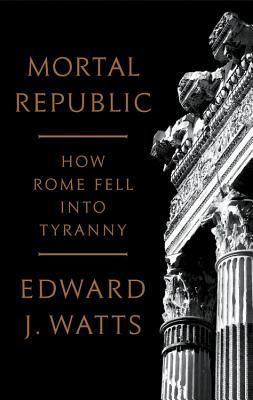
Mortal Republic
How Rome Fell into Tyranny
کتاب های مرتبط
- اطلاعات
- نقد و بررسی
- دیدگاه کاربران
نقد و بررسی

September 24, 2018
Watts (The Final Pagan Generation) outlines the end of the Roman republic to show “how republics built on Rome’s model might respond to particular stresses,” in this quick and clear, if at times dry, primer. Watts begins by depicting Rome’s journey to the status equivalent of a modern world power, by defeating Greek king Pyrrhus in 280 BCE, taking on Carthage in the Punic Wars, and achieving a final victory over Hannibal’s Carthage in 202 BCE. The book moves briskly through the evolution of the republic’s democracy in subsequent decades, including an early example of demagogic populism in the election and reign of Tiberius. The book ends with a deep analysis of Caesar’s ascent to autocratic power, his murder, and the rise of Emperor Augustus in 27 BCE. Readers will find many parallels to today’s fraught political environment: the powerful influence of money in politics, a “delegitimized establishment,” and “the emergence of a personality-driven, populist politicking.” Watts ably and accessibly—if in a somewhat formal, scholarly style—covers a lot of ground in a manner accessible to all readers, including those with little knowledge of Roman history. This well-crafted analysis makes clear the subject matter’s relevance to contemporary political conversations.

October 1, 2018
In a timely book of ancient history, an eminent classicist looks at Rome's decline from representative government to corrupt empire.What killed the Roman Republic? It wasn't plague, external enemies, civil war, or corruption, although all of those things played a role. No, writes Watts (Chair, History/Univ. of California, San Diego; Hypatia: The Life and Legend of an Ancient Philosopher, 2017, etc.), author of the superb The Final Pagan Generation (2015). What killed the Republic was its electorate. "A republic is not an organism," he writes, meaningfully. "It has no natural life span. It lives or dies solely on the basis of choices made by those in charge of its custody." That electorate chose to trade the freedoms and responsibilities of representative government for the security of the Pax Augusta, for "they came to believe that freedom from oppression could only exist in a polity controlled by one man." Watts chronicles the death as one by which the ambitions of would-be rulers, bribes offered and accepted, and votes bought and sold all contributed to the arrival of imperial and totalitarian rule. The seeds of destruction had been scattered long before the fact. As the author writes, for instance, even Rome at its height was no stranger to scandals, in one case requiring the unheard-of executions of three Vestal Virgins whose behavior had not, in fact, been appropriately virginal. Still, better angels often spoke, as when Pompey and Crassus, political foes on the brink of civil war, agreed to follow the rules such that "the most powerful men in the Roman state clearly specified that they trusted the system to protect them from their rivals and to allow them to compete fairly within the rules it set." Given that mistrust of institutions is a key ingredient in the collapse of republican rule, as we are witnessing daily, the lesson is pointed.An engaging, accessible history that, read between the lines, offers commentary on today's events as well as those of two millennia past.
COPYRIGHT(2018) Kirkus Reviews, ALL RIGHTS RESERVED.

November 15, 2018
In this swift and competent work, Watts (history, Univ. of California San Diego; The Final Pagan Generation) argues that analyzing how the Roman Republic gave way to the Augustan Principate in 27 BCE can explicate the current situation within the United States. The author traverses the period stretching from Rome's rise to preeminence during the second Punic War (218-02 BCE) to the end of the republic, detailing key developments, particularly focusing on the abandonment of compromise and traditional norms that held Roman politics together and fostered centuries of stability. While there are striking similarities of norm abandonment as well as the vilification of both political opponents and compromise in the United States, one cannot help but note that the story of Rome's collapse is one of increasing political and civil violence. VERDICT Watts's latest offers a solid argument and serves as a fine historical companion to Steven Levitsky and Daniel Ziblatt's How Democracies Die. It will appeal to audiences interested in both popular Roman history and contemporary American affairs.--Evan M. Anderson, Kirkendall P.L., Ankeny, IA
Copyright 2018 Library Journal, LLC Used with permission.

























دیدگاه کاربران